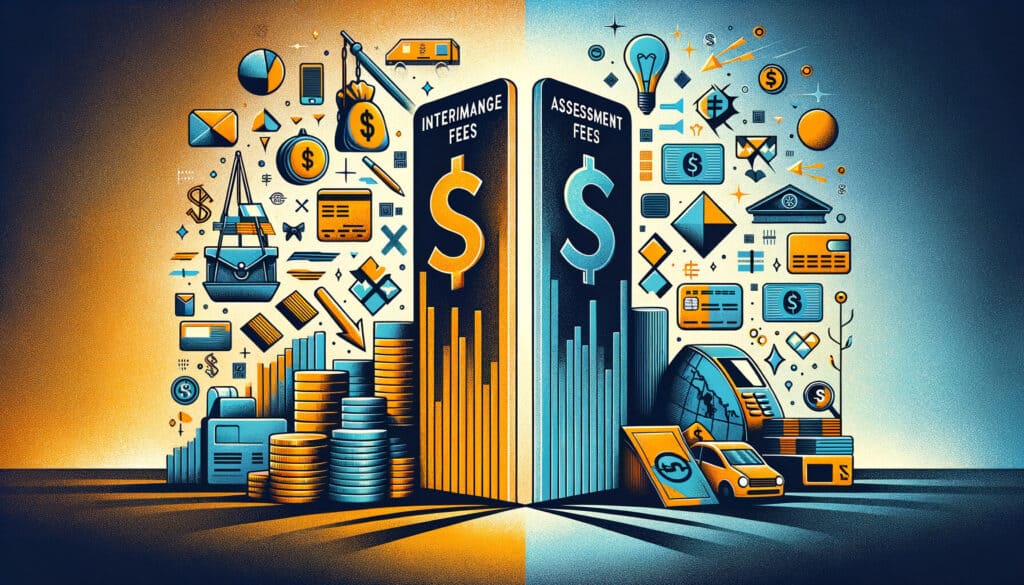
By Amanda Hoglund November 10, 2024
Credit card processing has become an essential part of modern business operations. With the rise of e-commerce and the increasing preference for cashless transactions, businesses need to understand the cost of credit card processing to make informed decisions.
This comprehensive article aims to provide a detailed understanding of credit card processing fees, pricing models, hidden charges, and tips for reducing costs. By the end of this article, readers will have a clear understanding of the factors that affect credit card processing costs and how to find the best deal for their business.
The Basics of Credit Card Processing Fees
When a customer makes a purchase using a credit card, the transaction goes through a complex process involving multiple parties. Each of these parties charges a fee for their services, resulting in credit card processing fees. The basic components of credit card processing fees include interchange fees, assessment fees, and the fees charged by the credit card processor.
Interchange fees are the fees charged by the credit card networks, such as Visa, Mastercard, and American Express. These fees are a percentage of the transaction value and vary depending on factors like the type of card used, the industry of the business, and the method of transaction. Assessment fees, on the other hand, are charged by the credit card networks to cover their operational costs. These fees are typically a fixed percentage of the transaction value.
Credit card processors, also known as merchant service providers, facilitate the transaction between the business and the credit card networks. They charge fees for their services, which can include a combination of flat fees, transaction fees, and monthly fees. The specific fees charged by credit card processors vary depending on the pricing model they use.
Understanding Interchange Fees and Assessment Fees

Interchange fees and assessment fees are two significant components of credit card processing costs. Interchange fees are set by the credit card networks and are non-negotiable. These fees are determined based on various factors, including the type of card used, the risk associated with the transaction, and the industry of the business. For example, a business in the travel industry may have higher interchange fees compared to a grocery store.
Assessment fees, on the other hand, are charged by the credit card networks to cover their operational costs. These fees are typically a fixed percentage of the transaction value and are also non-negotiable. Assessment fees are charged on top of interchange fees and vary depending on the credit card network.
Different Types of Credit Card Processing Pricing Models

Credit card processors offer different pricing models to businesses, each with its own advantages and disadvantages. The three main pricing models are interchange plus pricing, tiered pricing, and flat-rate pricing.
Interchange plus pricing is considered the most transparent pricing model as it separates interchange fees and processor fees. In this model, the processor charges a fixed markup on top of the interchange fees. This allows businesses to see the exact cost of each transaction and ensures transparency.
Tiered pricing, also known as bundled pricing, categorizes transactions into different tiers based on their risk level. Each tier has a corresponding rate, and the processor charges a fee based on the tier in which the transaction falls. While tiered pricing can be convenient, it lacks transparency as businesses may not know the exact cost of each transaction.
Flat-rate pricing is a simplified pricing model where the processor charges a flat fee for each transaction, regardless of the interchange fees. This model is popular among small businesses due to its simplicity, but it may not be cost-effective for businesses with high transaction volumes or larger ticket sizes.
Factors Affecting Credit Card Processing Costs

Several factors can affect credit card processing costs for businesses. Understanding these factors is crucial for businesses to optimize their payment processing expenses. Some of the key factors include:
- Transaction Volume: The number of credit card transactions processed by a business can significantly impact costs. Higher transaction volumes may allow businesses to negotiate lower rates with credit card processors.
- Average Ticket Size: The average value of each transaction can also affect costs. Credit card processors may charge higher fees for larger ticket sizes due to the increased risk associated with higher-value transactions.
- Industry Type: Different industries have different risk levels associated with credit card transactions. High-risk industries, such as travel or adult entertainment, may face higher interchange fees and assessment fees compared to low-risk industries like retail or grocery.
- Payment Method: The method of payment can also impact costs. Card-present transactions, where the customer’s card is physically present, typically have lower fees compared to card-not-present transactions, such as online or phone orders.
- Card Type: The type of credit card used by the customer can also affect costs. Premium cards, like rewards or corporate cards, often have higher interchange fees compared to standard cards.
Hidden Fees and Additional Charges in Credit Card Processing

While credit card processing fees are transparent to some extent, there are often hidden fees and additional charges that businesses need to be aware of. These fees can significantly impact the overall cost of credit card processing. Some common hidden fees and additional charges include:
- Monthly Minimum Fees: Some credit card processors impose a minimum monthly fee, regardless of the transaction volume. This fee ensures that the processor earns a minimum amount from the business each month.
- PCI Compliance Fees: Payment Card Industry (PCI) compliance is a set of security standards that businesses must adhere to when processing credit card transactions. Some processors charge additional fees for PCI compliance, which can vary depending on the level of compliance required.
- Chargeback Fees: Chargebacks occur when a customer disputes a credit card transaction. Credit card processors may charge fees for each chargeback, which can include the cost of investigating the dispute and potential penalties.
- Early Termination Fees: Some credit card processors lock businesses into long-term contracts and charge hefty fees for early termination. It is essential for businesses to carefully review the terms and conditions before signing up with a processor to avoid unexpected fees.
Tips for Reducing Credit Card Processing Costs
Businesses can take several steps to reduce their credit card processing costs and optimize their payment processing expenses. Here are some tips to consider:
- Negotiate Rates: Businesses should not hesitate to negotiate rates with credit card processors. Depending on the transaction volume and industry type, processors may be willing to offer lower rates to secure the business.
- Understand Pricing Models: It is crucial for businesses to understand the different pricing models offered by credit card processors. By comparing the pros and cons of each model, businesses can choose the one that best suits their needs and minimizes costs.
- Review Statements Regularly: Businesses should review their credit card processing statements regularly to identify any hidden fees or additional charges. If any discrepancies are found, businesses should contact their processor to clarify and resolve the issue.
- Optimize Payment Methods: Offering multiple payment methods, such as digital wallets or ACH transfers, can help businesses reduce credit card processing costs. By encouraging customers to use lower-cost payment methods, businesses can save on interchange fees.
- Invest in Technology: Upgrading to modern payment processing technology can help businesses streamline operations and reduce costs. Integrated payment solutions and point-of-sale systems can automate processes, reduce errors, and improve efficiency.
Comparing Credit Card Processors: Finding the Best Deal
When choosing a credit card processor, businesses should carefully compare different options to find the best deal. Here are some factors to consider during the comparison process:
- Pricing Structure: Understanding the pricing structure of each processor is crucial. Businesses should compare the rates, fees, and additional charges of different processors to determine which one offers the most cost-effective solution.
- Customer Support: Reliable customer support is essential when dealing with credit card processing issues. Businesses should consider the responsiveness and availability of customer support when comparing processors.
- Integration Options: If a business already uses specific software or systems, it is important to ensure that the credit card processor integrates seamlessly with those systems. Integration can save time and reduce errors in the payment processing workflow.
- Reputation and Reviews: Researching the reputation and reviews of credit card processors can provide valuable insights into their reliability and customer satisfaction. Businesses should consider the experiences of other businesses in their industry when making a decision.
- Contract Terms: Carefully reviewing the terms and conditions of the contract is crucial to avoid unexpected fees or long-term commitments. Businesses should ensure that the contract terms are favorable and align with their specific needs.
Frequently Asked Questions about Credit Card Processing Costs
Q1. What are interchange fees?
Interchange fees are the fees charged by credit card networks for processing transactions. These fees are non-negotiable and vary depending on factors like the type of card used, the industry of the business, and the method of transaction.
Q2. What are assessment fees?
Assessment fees are charged by credit card networks to cover their operational costs. These fees are typically a fixed percentage of the transaction value and are non-negotiable.
Q3. What are the different pricing models for credit card processing?
The three main pricing models for credit card processing are interchange plus pricing, tiered pricing, and flat-rate pricing. Each model has its own advantages and disadvantages, and businesses should choose the one that best suits their needs.
Q4. How can businesses reduce credit card processing costs?
Businesses can reduce credit card processing costs by negotiating rates with processors, understanding pricing models, reviewing statements regularly, optimizing payment methods, and investing in technology.
Q5. What should businesses consider when comparing credit card processors?
When comparing credit card processors, businesses should consider factors like pricing structure, customer support, integration options, reputation and reviews, and contract terms.
Conclusion
Understanding the cost of credit card processing is crucial for businesses to make informed decisions and optimize their payment processing expenses. By understanding the basics of credit card processing fees, the different pricing models, and the factors that affect costs, businesses can navigate the complex world of credit card processing more effectively.
By being aware of hidden fees and additional charges, businesses can avoid unexpected expenses and reduce costs. By following the tips for reducing credit card processing costs and comparing different processors, businesses can find the best deal that aligns with their specific needs. With this comprehensive understanding, businesses can streamline their payment processing operations and focus on growing their business.